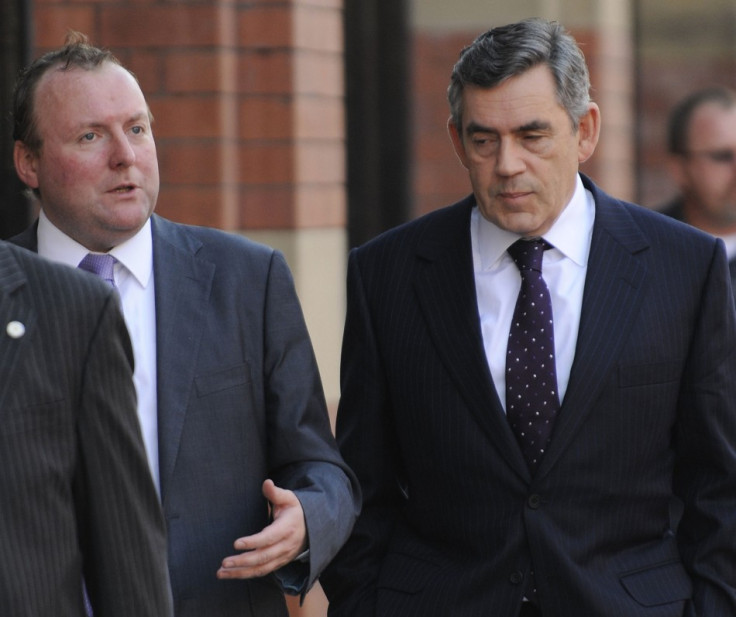McBrideshead Revisited: Spin-doctor Damian Reopens Labour's Old Brown-Blair Wounds

With impeccable timing, as the Labour party gathers for its annual conference in Brighton, Gordon Brown's old spin-doctor and hatchet man Damian McBride has released his memoirs detailing the dark and sleazy machinations which polluted the battle for power between his former boss and then-prime minister Tony Blair.
House of Cards has nothing on this tale of fabrication, blackmail, lies and career-destroying black propaganda. And it will hang over the Labour rally where Ed Miliband and Ed Balls, two of Brown's closest allies, will attempt to prove the party has put such antics behind it.
For anyone who witnessed the blood-soaked battle between Blair and Brown first-hand, the revelations contained in the new book, entitled Power Trip, come as no great surprise. Some of the detail, however, does.
As McBride boasts, it includes stories of "drug use, spousal abuse, secret alcoholism, and extra-marital affairs" - all ammunition he wielded to do in Brown's perceived enemies.
As is now traditional with such revelations, the newspaper serialisation has come at the most lucrative time for such a publication, which also happens to be the time it will create the most anguish for the party McBride was supposed to have been working for.
But, as his lurid tales reveal, "McPoison" as he was universally known in Westminster, devoted most of his formidable talents to promoting his leader, Brown, a man he describes as "the greatest man I ever met", and doing down his arch-rival Blair.
Power Trip
Most of these battles were carried out by proxy, with both sides using shadowy figures and back-alley briefings to spread disinformation, lies and smears through the media.
So it also comes as no surprise that a former aide from the Blair camp, Benjamin Webb-Prosser, attempted to pre-empt McBride's memoirs by releasing hundreds of emails to a rival newspaper detailing their side of the battle.
As the Daily Mail was splashing its "Poison at the heart of Downing Street" story, based on McBride's revelations, so the Guardian unearthed "Blair's bunker", based on emails provided by Wegg-Prosser, who declared he did it to "remind the party of the dangers of factionalism" - presumably by reviving them.
The key revelations in his book set out how McBride helped destroy Home Secretary Charles Clarke by fabricating a briefing war between him and a key adviser to Blair; leaked details of alleged "drinking, fighting and carousing" by cabinet minister John Reid; and spread claims that minister Ivan Lewis had pestered a female aide.
He says he helped Brown create a group of "moles" in rivals' camps to spy on them, and reveals how Brown secretly supported Ed Miliband over his brother David - and even his own closest friend Ed Balls - for the leadership.
The book even claims Douglas Alexander, the current shadow foreign secretary, knifed his own sister Wendy, the Scottish Labour leader, by suggesting she should be sacked over a donations controversy.
McBride, a Catholic who says he now regrets much of what he did, explains: "When you do the job I did, in the way that I did, you become some diabolical inversion of a priest in the confessional box; told other people's sins precisely in the hope that you'll expose them to the world.
"Drug use; spousal abuse; secret alcoholism; extra-marital affairs. I estimate I did nothing with 95% of the stories I was told. But, yes, some of them ended up on the front pages of Sunday newspapers.
"The people passing on such information had varying motives.
"Ambitious MPs or political advisers often wanted to destroy a rival without getting their hands dirty, while others were so outraged by a colleague's behaviour that they just wanted to see him get his comeuppance.
"As for me, in a roundabout way I was doing it to protect Gordon Brown.
"Until I completely lost my way at the end, everything I did as Gordon's spin doctor, I did out of devotion, out of loyalty and out of some degree of love for the greatest man I ever met.
"Some people will undoubtedly wonder why - if Gordon knew I was guilty of misbehaviour - he never either formally reined me in or had me moved on.
"And my answer to that is simply that there was something unspoken between us. Not what people imagine, that he would mutter under his breath about turbulent priests and hope that I would do his bidding, but the opposite.
"The unspoken word was from me to him and said: 'Don't question my methods'."
Thanks to these memoirs, which will provide endless ammunition for the Conservative Party during the Labour conference and beyond, those methods have now been exposed to the full glare of daylight.
READ:
Westminster Times: Ineptocracy, Defections, Thatcher Day and Boris - Again
© Copyright IBTimes 2025. All rights reserved.






















